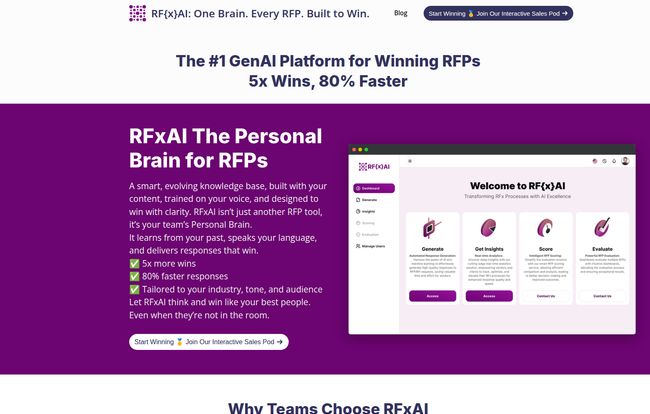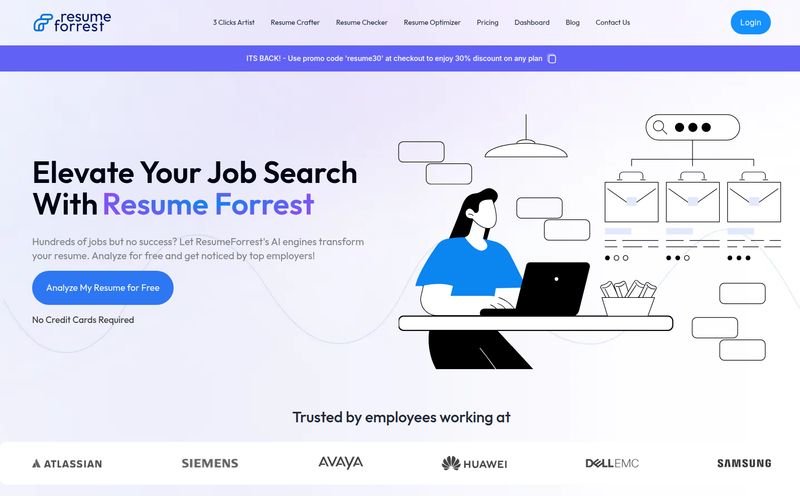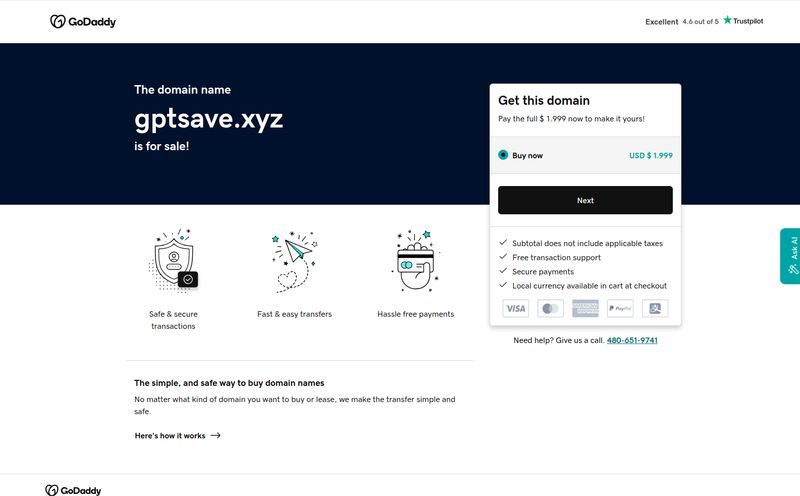If you've ever been in sales, business development, or any role that involves responding to a Request for Proposal (RFP), you know the feeling. It's that 9 PM dread when a 150-page beast of a document lands in your inbox, due in a week. Your heart sinks. Your evening plans evaporate. You resign yourself to a week of caffeine, copy-pasting from old documents, and desperately trying to sound enthusiastic about 'synergistic value propositions'.
I've been there more times than I care to admit. The whole RFx process can feel like a necessary evil—a mountain of tedious work for a shot at a big win. For years, we've just accepted it. But what if we didn't have to? I’ve been keeping a close eye on the AI boom, wondering when a tool would come along that actually understands the soul-crushing nature of the RFP. And I think I might have found it. It’s called RFxAI, and it bills itself as a "Personal Brain for RFPs."
A bold claim. But after digging into it, I’m starting to think it's not just marketing fluff.
What on Earth is RFxAI, Anyway?
Okay, so on the surface, RFxAI is an AI platform designed to help you answer RFPs and other 'Request for X' documents faster. But that’s selling it short. It’s not just another souped-up document template or a glorified search function. The whole idea is that it acts like an extension of your team’s collective knowledge.
Think of it like this: every proposal you’ve ever written, all your product documentation, your best case studies, and your sharpest marketing copy—it all gets fed into this AI. RFxAI then learns your company's voice, your products, and your specific industry's language. So when that new RFP lands, you’re not starting from a blank page. You’re starting with an AI-powered partner that already knows 80% of the answers and can draft them in a way that sounds like… well, you.
They’re throwing around some wild numbers, like 5x higher win rates and an 80% reduction in time and cost. As a seasoned (and slightly cynical) marketer, I always take stats like that with a grain of salt. But even if it only delivers half of that promise? That’s still a monumental shift in how businesses can approach growth.
A Look Under the Hood at RFxAI's Core Features
So, what’s actually powering this thing? It’s not just one feature, but a suite of tools that work together. They call them 'Solutions,' and they tackle different parts of the RFP headache.
The AI-Powered Scribe and Strategist
The main event is RFxAI Generate. This is the workhorse that drafts the responses. You upload the RFP, and it gets to work, pulling information from its knowledge base to create highly relevant, tailored answers. It’s designed to go way beyond generic boilerplate.
Then you have things like RFxAI Insights and RFxAI Prioritize, and this is where it gets really interesting for me. These tools don't just write; they think. They provide real-time scoring on your responses, highlight potential win/loss factors, and help you focus on the opportunities that you’re most likely to close. It's like having a data scientist and a seasoned sales director whispering advice in your ear as you work. No more chasing long-shot bids because of a gut feeling.

Visit RFxAI
There's also RFxAI Evaluate for AI-assisted peer reviews and RFxAI Optimize, which ensures the platform is continuously learning from every win, loss, and edit. This continuous improvement loop is what separates a truly 'smart' platform from a simple automation tool. It's not static; it grows with your business.
Who is This AI Proposal Tool Really For?
Honestly, when I first saw the list of industries RFxAI serves—from Healthcare and Pharma to Construction and Cybersecurity—I was a bit skeptical. The needs of a public sector bid are worlds away from a fintech proposal. But the secret sauce seems to be in the personalization. Because the AI is trained on your company's specific historical data, it adapts.
This isn’t a one-size-fits-all solution. It’s more like a foundational brain that you then send to college to major in whatever your company does. It’s built for teams that see RFPs not just as a task, but as a critical revenue stream. Whether you're a 10-person consultancy trying to punch above your weight or a massive enterprise with a dedicated proposal team, the underlying problem is the same: time is money, and expertise is hard to scale.
The Big Question: What Does RFxAI Cost?
Alright, let's talk turkey. A tool this powerful doesn't come free. I took a look at their pricing page, and it’s clearly structured for serious business users. Here’s a quick breakdown I put together:
| Plan | Price (Billed Yearly) | Best For |
|---|---|---|
| RFxAI Starter | $299 / month | Teams just starting with AI, handling up to 12 RFPs per year. |
| RFxAI Pro | $799 / month | Scaling teams with regular RFP volume (up to 36 per year), needing priority support. |
| RFxAI Enterprise | Custom Pricing | High-volume teams needing custom integrations (CRM, etc.) and dedicated support. |
My take? That $299/mo for the Starter plan might cause some sticker shock for a solo consultant, but let's do some quick math. If a single RFP takes your team 40 hours of work, and you value your time at, say, $100/hour, that's a $4,000 cost per proposal. If RFxAI can cut that time in half, it pays for itself with the very first project. The Pro and Enterprise plans are squarely aimed at companies where proposal writing is a full-time function, and the ROI there could be absolutely massive.
The Good, The Bad, and The AI-Powered Reality
No tool is perfect, and it’s important to go in with eyes wide open. Based on my analysis and years of seeing tools like this come and go, here's my honest breakdown.
The Advantages
The upsides are pretty clear. The efficiency gains are huge. We’re talking about slashing response times from weeks to days, or days to hours. This frees up your smartest people to do what they do best: strategize and build relationships, rather than hunting for that one perfect paragraph from a 2019 proposal. The move towards personalized, data-driven answers is a huge leap from the generic content mills of the past. And according to some reports, like one from Loopio, top-performing teams are already twice as likely to use response management software. This is where the market is headed.
The Potential Hurdles
On the flip side, this isn't a magic wand. My main concern would be over-reliance on the AI. You still need a human expert in the loop to review, refine, and add that final strategic touch. The AI is your co-pilot, not the pilot. There's also an initial setup cost—not just money, but the time it takes to upload your historical data and get the AI trained. And for deep, custom integrations with your existing CRM or document management systems, you're looking at the Enterprise plan, which is a significant commitment.
My Final Take: Is RFxAI Worth the Investment?
After sifting through it all, I'm genuinely excited about what RFxAI represents. For too long, the RFP process has been a reactive, brute-force activity. This tool flips the script, making it proactive and strategic. It's about working smarter, not just harder.
Is it for everyone? Probably not. If you only answer one or two simple RFPs a year, it might be overkill. But if your business growth is tied to winning competitive bids, and you're tired of losing your best people to burnout from the proposal grind, then yes. I believe it's absolutely worth a serious look. This is the kind of advantage that doesn't just win you one deal; it could fundamentally change how you compete.
Frequently Asked Questions about RFxAI
How does RFxAI actually learn my company's specific information and tone?
It learns primarily through the documents you provide it. You upload your past proposals (both wins and losses), product guides, white papers, and other company literature. The AI analyzes this content to build a personalized knowledge base, capturing your unique voice, technical details, and successful arguments.
Is my company's sensitive data secure on the platform?
This is a critical question for any AI tool. According to their site, they are built by ex-Salesforce, Google, and Oracle folks and hosted on major cloud infrastructure like AWS, which comes with a high level of security. For specific compliance needs, especially in finance or healthcare, you'd want to discuss details directly with their team, likely on an Enterprise plan.
Can RFxAI integrate with other tools like Salesforce or SharePoint?
Yes, but this functionality is reserved for the RFxAI Enterprise plan. The custom integrations allow for a more connected workflow, where data can flow between your CRM, document management system (DMS), and the RFxAI platform.
What if I only do a few RFPs a year? Is the Starter plan worth it?
The Starter plan includes 12 RFPs per year, or one per month. If you do fewer than that but they are high-value and time-intensive, it could still provide a strong return on investment. The key is to calculate the cost of the man-hours you currently spend vs. the platform's cost.
Does the AI write the entire proposal for me from start to finish?
No, and that's a good thing. It generates high-quality drafts for each question in the RFP, but it requires a human to review, edit, and approve the final content. Think of it as an incredibly efficient assistant who does 80-90% of the heavy lifting, freeing you up for the final strategic polish.
The game is changing. The days of manual, repetitive proposal work are numbered. Tools like RFxAI aren't just about saving time—they're about injecting intelligence into a process that desperately needs it. Maybe it’s time to give your personal RFP brain the upgrade it deserves.
Reference and Sources
- Loopio. (2023). 2023 RFP Response Trends & Benchmarks Report. Retrieved from https://www.loopio.com/blog/2023-rfp-response-trends-report
- Gartner. Sales Technology Hype Cycle. (General concept, specific report may be behind a paywall). Insights on the evolution of sales tech and AI. Retrieved from https://www.gartner.com/en/sales/trends/sales-tech-hype



